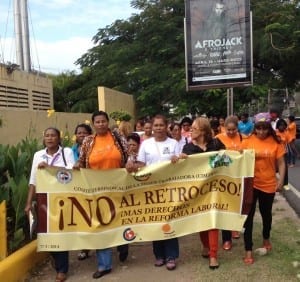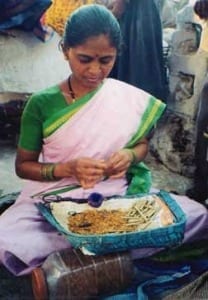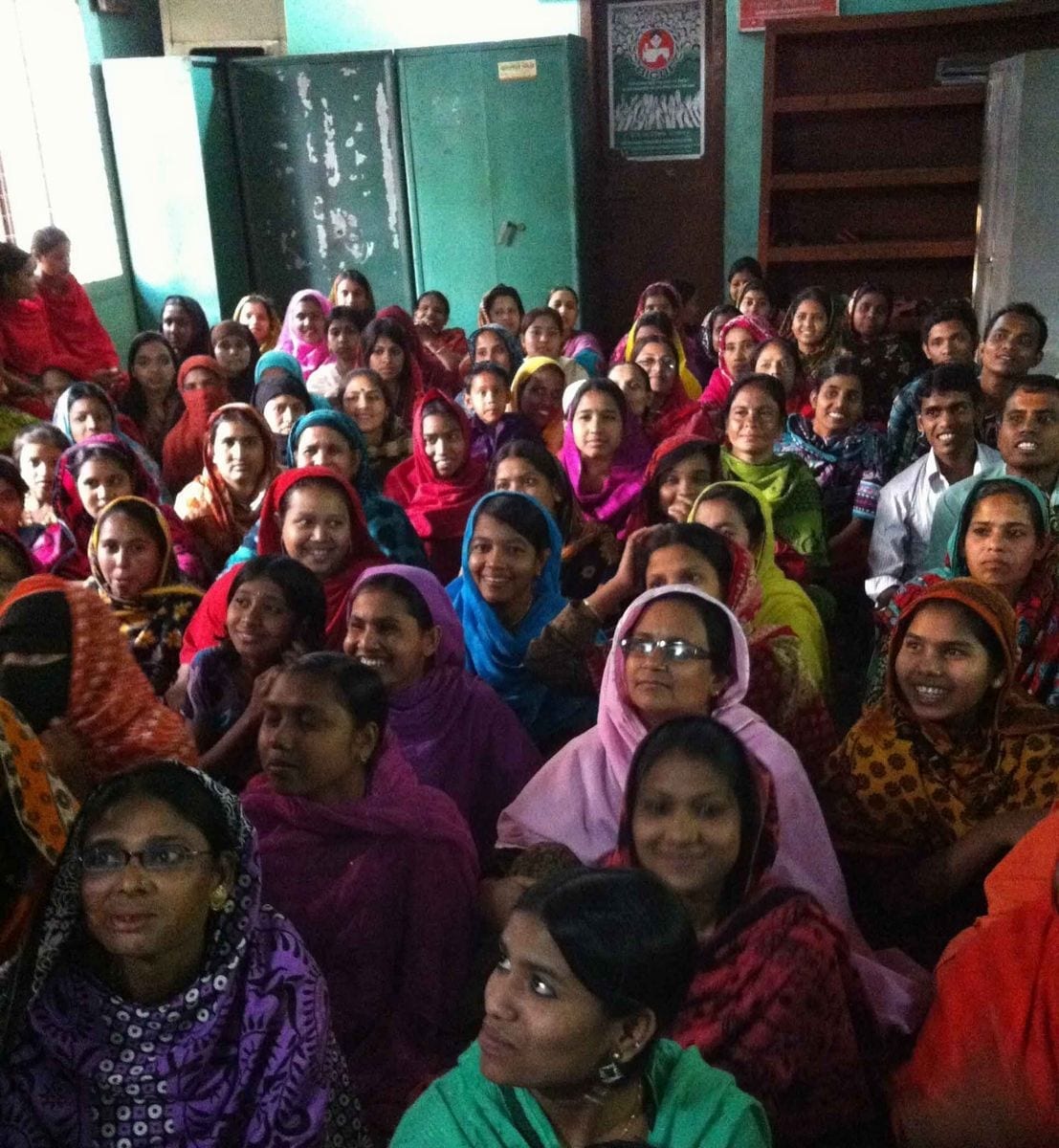Mar 7, 2014

Dominican Republic workers rallied on the eve of International Women’s Day. Credit: Geoff Herzog
Chanting, “No to Labor Code rollbacks, no to human rights rollbacks,”100 workers today marched on the Business Tower in Santo Domingo, the Dominican Republic capital, to oppose corporate-backed attempts to weaken labor code protections for working women and men.
The Inter-Union Committee of Working Women (CIMTRA) organized the rally on the eve of International Women’s Day to highlight how business’s proposed changes would especially harm working women.
The Business Tower is headquarters of the National Council for Private Enterprise (CONEP). Unionists say CONEP is promoting a labor reform proposal that would drastically reduce existing labor rights. President Danilo Medina formed a commission to review and modernize the Labor Code last fall, and business and unions have both submitted proposals.
Eulogia Famila, CIMTRA spokeswoman and vice president of the National Confederation of Union Unity, addressed the crowd from the steps of the Business Tower.
“While the proposal from private enterprise would roll back rights for all workers, it’s particularly damaging to women,” Famila said. “It would exclude domestic workers from most labor rights and would allow the termination of contracts with pregnant women by ‘mutual consent’ without prior approval from the Labor Ministry. By putting the burden of proof on a worker filing a complaint against an employer, it would make it even more difficult for women to sue over discrimination and harassment.”
The business council refused to receive representatives from the group, even though workers had tried to make an appointment to present the council with a four-page letter from CIMTRA and the three main labor confederations.
“Today we mobilized women and youth to commemorate International Women’s Day and to oppose business efforts to roll back labor rights. From here on in, we will join with the three confederations continuing to take to the streets to defend our rights,” Famila said as the rally concluded.
Mar 6, 2014

Self-employed bidi rollers in India have access to social services because of SEWA’s efforts. Credit: SEWA
Each day this week leading up to International Women’s Day March 8, the Solidarity Center will highlight an example of how women and their unions are taking action to improve women’s lives on the job, in their unions and in their communities.
India passed a landmark Street Vendors Act this month that, for the first time,recognizes the country’s 40 million street vendors as workers deserving of rights and labor law coverage equal to all other wage earners.
Behind the passage of the Protection of Livelihood and Regulation of Street Vending Act are decades of struggle by a dedicated group of women who in 1972 began organizing women workers in informal economy jobs like home-based cigarette (bidi) rollers. Today, the Self Employed Women’s Association (SEWA) includes 1.7 million women workers across the country, 200,000 of whom are street vendors.
“This is a proud moment for us at SEWA as we have struggled hard to improve the situation of street vendors, many of them women who were earlier denied the right to a respectful livelihood and subjected to severe exploitation,” says SEWA National Secretary Manali Shah.
SEWA members and allies waged a hunger strike in New Delhi and took other action to press lawmakers in India’s upper house of Parliament to pass the bill, which the lower house approved last year. Their actions exemplify the type of public education and outreach members have undertaken to make visible workers who are not accorded the same rights and protections as those employed in formal sector jobs.
SEWA members are among the most marginalized of India’s workers: Self-employed, their income is unpredictable and few receive social welfare benefits, unlike workers in formal-economy jobs. More than 94 percent of women workers in India work in the informal-sector economy.
The union began when five women went door to door to learn the most pressing issues for self- employed women, said Geeta Koshti, a coordinator in SEWA’s legal department. The early SEWAorganizers then identified women who could take leadership roles, and they recruited local organizers who, as trusted members of their communities, could better connect with women workers.
Women who join with SEWA go on to form their own local trade union councils where they make decisions about the types of campaigns they want to pursue and hold trainings on membership education and leadership development. Some have created worker cooperatives and other organizations to assist their members.
SEWA is very much a member-driven organization, said Koshti, and the union prioritizes its efforts in accordance with its members. For instance, if workers say they want clean water, the union does not run other unrelated campaigns.
From a handful of women in Ahmedabad, Gujarat, SEWA has expanded to represent women in 14 Indian states. One of SEWA’s most successful endeavors involves women in the bidi trade. Koshti, whosemother was a bidi roller and SEWA member, said SEWA’s multiyear efforts culminated in a Bidi Welfare Board, one of the few such institutions for workers in the informal sector. The board is responsible for implementing a benefits program that allows bidi workers to have access to social services, such as healthcare and educational scholarships for children.
SEWA, which its leaders describe as both an organization and a movement, includes programs such as a shareholder organization to assist artisans in marketing their crafts and a microcredit bank.
Koshti adds that SEWA’s integrated, holistic approach addresses all the issues women face, such as child care. In short, the union is driven by a real strong commitment to ensure members are involved.
Mar 6, 2014
Workers at the Taratex BD Ltd. garment factory in Bangladesh have been targets of violence and mass firings, according to the Bangladesh Independent Garment Workers Union Federation (BIGUF).
The workers filed for union registration at the factory in Gazipur, outside of the capital, Dhaka, on February 4, 2014. Since then, they say they have since endured a fierce anti-union campaign by management. A reported 86 union supporters at the factory have been fired, including 12 members of the union’s factory-level executive committee.
Many of these workers told BIGUF they have been verbally or physically assaulted and asked to sign papers of an unknown nature. Factory workers who support the union also report being visited at their homes and threatened.
On February 22, union vice president Farahad and union supporters Sohel and Mostak told BIGUF they were detained and physically assaulted as they attempted to enter the factory. They said police refused to accept their crime reports or pursue the incident. Six union members told BIGUF they have been forced to leave their homes for fear of their personal safety.
BIGUF filed an unfair labor practice on February 24 and contacted the Bangladesh Garment Manufacturers and Exporters Association (BGMEA) for assistance in resolving the issue. BGMEA, the trade association representing Bangladesh export manufacturers, has not yet responded.
Mar 5, 2014

Phumzile Mashishi, HOSPERSA gender project officer, helped lead the gender action learning process in her union.
Each day this week, leading up to International Women’s Day March 8, the Solidarity Center is highlighting an example of how women and their unions are taking action to improve women’s lives on the job, in their unions and in their communities.
Unions around the world are at the forefront of the struggle for gender equality. And sometimes, that means taking a look at their own structures, policies and practices to ensure they, too, are working to make equal treatment and non-discrimination central to their efforts.
In South Africa, four unions grappling with the complexities of gender inequality took part in a structured, multiyear process facilitated by the South Africa Gender Action Learning Program. The group is part of Gender at Work, a global nongovernmental organization that helps organizations become models for a more equitable and accountable world.
The unions—which represent building and construction workers, health care and retail workers and farm workers—recognized that male-dominated, hierarchical, union culture does not easily address issues such as sexual harassment and violence against women within the union, and they sought to develop alternative models of power. The process involves feminist popular education, interactive learning and a lot of work “at the consciousness-raising level,” said Nina Benjamin, who led the project which, for one union, began in 2005. Benjamin is gender research program coordinator for Labour Research Service/Gender at Work, South Africa.
A recent Solidarity Center-sponsored report, “Bringing Back the Heart,” explores the Gender at Work process with these unions and details how the partnerships achieved tangible results:
• Increasing numbers of women joined the unions,
• More women ran for union leadership positions,
• Union leadership gained a deeper understanding of worker concerns and became more accountable in addressing them, and
• Union activists reported that the process reinvigorated and re-inspired them, even in the face of widescale workplace restructuring and deteriorating working conditions.
The process ensured that gender work was not relegated to the status of an “add on.” Leaders developed unionwide strategies for achieving gender equality—and made notable progress.
• The South African Commercial Catering and Allied Workers Union (SACCAWU), which organizes workers in the hospitality, catering, retail, service, tourism and finance sectors, includes a majority of women as members—but few had been union leaders. Following its partnership with Gender at Work, women routinely ran for and were elected into key leadership positions at the worksite level.
• The autonomous, women-led trade union, Sikhula Sonke, reported that membership was growing, domestic violence was decreasing and union leaders were tackling broader discrimination issues (such as xenophobia, homophobia and HIV). The union, which organizes those who live and work on fruit and wine farms, also found farmworkers’ daily lives were improving and they were gaining access to new resources.
• The predominantly male construction union, the Building, Construction and Allied Workers Union (BCAWU) engaged key male leaders in the Gender at Work process, with the result that more women have joined the union, and they now increasingly participate in the union, such as by becoming shop stewards.
• Health and Other Service Personnel Trade Union of South Africa (HOSPERSA), which represents public and private health-care workers, primarily nurses, expanded its reach to grassroots members. Together with union leaders, they are building a new culture of unionism—broadening campaigns from a focus on wages to include issues central to the lives and work of its predominantly female membership.
These four unions demonstrate the challenges of organizational change, but their experiences also show that even in unions with diverse memberships and experiences, a focus on gender equality can empower women and return the balance of power back to members.

Mar 5, 2014
More than 400 Bangladesh garment workers and trade unionists rallied over the weekend at the National Press Club in Dhaka, the capital, to demand police take action to find perpetrators who beat and badly injured a garment worker leader and four union organizers last week. The group was talking with garment workers when they were attacked, and police subsequently refused to accept a report on the incident.
After rallying at the Press Club, union activists and their allies marched to the Ministry of Home Affairs, where staff received a small delegation of activists and accepted their letter calling for government officials to pursue justice for the victims. Later that night, police accepted the crime report from the victims of the violent attack, the prelude to beginning an investigation.
Participants in the rally and march include members and leaders of the Bangladesh Federation of Workers Solidarity (BFWS), where the injured organizers work, the Bangladesh Garments and Industrial Workers Federation (BIGUF), the Sommilito Garments Sromik Federation (SGSF), Bangladesh Garments and Industrial Sramik Federation (BGIWF) and the National Garment Workers Federation (NGWF).
The factory, which had been closed following a workers’ protest against the business not paying the minimum wage on February 18, was fully reopened on March 2. Some 30 workers now say they have been verbally terminated.




